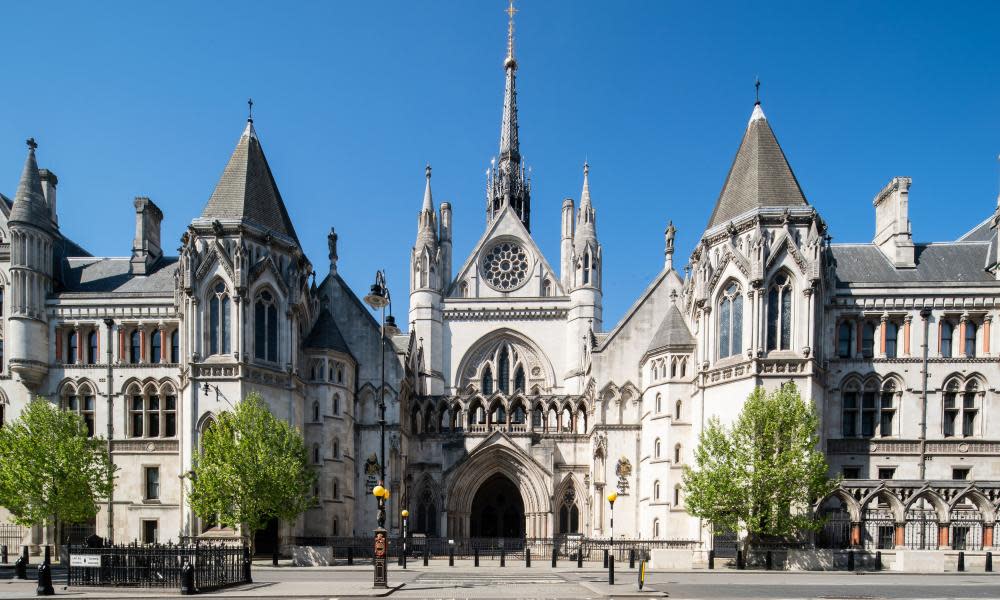High court hears legal challenge to England's lockdown restrictions

The government’s lockdown that has closed schools, premises and companies while limiting free movement is the “most sweeping and far-reaching” restriction on fundamental rights since the second world war, the high court has been told.
In a challenge to the legality of emergency legislation, the businessman Simon Dolan, whose Jota Aviation company has been delivering personal protective equipment (PPE) to the NHS, is testing the full extent of the powers under which England has been confined for the past 101 days.
The hearing is taking place via video link due to the coronavirus crisis, with lawyers participating remotely from their homes or chambers.
The emergency restrictions, announced by the prime minister on 23 March, are illegal, breach human rights laws and fail to take account other significant factors, lawyers for Dolan argue.
Opening the case, Philip Havers QC, for Dolan, said it was aimed at challenging the “most sweeping and far-reaching restrictions on fundamental rights in England since world war two, if not before”.
The powers being used, despite the easing of lockdown, he said, were “still unlawful and disproportionate” while the government has indicated that it may yet reimpose “stringent restrictions”.
The risk of any child without a pre-existing medical condition suffering serious illness is “vanishingly small”, Havers said. “There’s no reason not to send all the children back to school.”
Havers questioned whether the Public Health (Control of Diseases) Act 1984 and the Health Protection (Coronavirus Restrictions) (England) Regulations 2020 had indeed given the government power to close businesses.
In written submissions to the high court, lawyers for Dolan said: “The almost unbelievably complicated and arbitrary [government] guidelines – not adequately reflected in the … regulations – are symptomatic of a government that is seeking to impose a degree of control and micro-management over the lives of its citizens that is wholly incompatible with [human rights law] and that is not proportionate to the harm that the rules are designed to combat.”
A statement submitted by Michael Gardner, a solicitor representing Dolan, declared: “Extraordinarily elaborate and complicated rules have now been imposed on the whole population – irrespective of whether they are in high risk groups or not.”
There had been inadequate parliamentary scrutiny of the regulations and their impact, the court has been told.
The case has been paid for through crowd-funding on the CrowdJustice website, which has already raised more than £200,000.
The case, being heard by Mr Justice Lewis in the high court, is formally a permission hearing, which decides whether the challenge can proceed to a full trial of the issues.
Nonetheless, the main arguments on both sides are being explored. The claim has been brought against the secretary of states for health and education, who are represented by Sir James Eadie QC, the Treasury Devil who leads for the government in important cases.
Eadie, representing the government, told the high court: “In the early weeks of lockdown there were unprecedented and serious risks to life when the pandemic was at its height. The fear was that the NHS would be overwhelmed.
“There have been extraordinary efforts made right across government and the NHS to avoid that. The steps taken in the early days and the severity of the restrictions were precisely based on the seriousness of the risk. Many patients were in critical care … including, it may be added, the prime minister himself.”
Provision for such emergency restrictive health regulations, Eadie said, was available to government under pre-existing laws so that measures can be brought in at short notice. This legal challenge to the regulations had been unnecessarily delayed, he said, and successive amendments have changed them on several occasions.
Dolan said after the hearing: “This government sent the whole country into an enforced lockdown just over 100 days ago and in that time the economy has suffered damage the like we have not seen in 300 years. Hundreds of billions have been wiped off a previously healthy economy and millions of people are now out of work.
“The announced jobless numbers in the past few days makes for devastating reading: 12,000 jobs lost at British Airways, 3,000 at Rolls Royce, 3,000 at The Restaurant Group and 1,700 at Airbus. These are just the numbers publicised now, just think about those who are going to have to support families with no guaranteed income in the months ahead. The harmful toll of the lockdown on the hardworking British public is unacceptable.”
Mr Justice Lewis said he would reserve judgment until next week.

 Yahoo News
Yahoo News 
